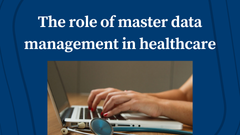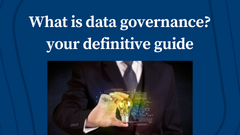By Ben Werth, CEO at Semarchy
Every technological revolution has its tipping point. For enterprise data operations, that moment arrives in 2025. In my conversations with clients, one theme emerges consistently: while everyone is racing to adopt AI in one form or another, mastering the data foundation it requires remains a major challenge. Addressing that challenge moves to the forefront this year, with DataOps leading the charge. Here are the five critical shifts I see coming:
1. ‘Data for AI, AI for People’: A robust data management strategy will be the bridge between enterprise AI potential and value realization. In 2025, organizations will finally start cracking the code to unlock this potential: combining trusted, well-managed data foundations with generative AI. Those who master this trifecta – clean data, intelligent automation, and human expertise – will see exponential gains in productivity and innovation. This isn’t about AI working in isolation; it’s about AI working with high-quality, well-governed data as a true enterprise solution.
2. The Adoption of End-to-End DataOps will Revolutionize Enterprise Agility: 2025 will mark the end of fragmented data management approaches that have hobbled innovation for decades. Forward-thinking organizations will implement comprehensive DataOps strategies that span the entire data lifecycle – from ingestion to insights. This shift isn’t merely operational; it’s transformational. Companies that build unified, automated data operations will achieve unprecedented agility, reducing time-to-insight by orders of magnitude while driving data quality at every step. The competitive advantage? The ability to respond to market changes in real-time, not quarters.
3. “Production Ready” Data Becomes an Organizational Imperative: Organizations have historically wasted most of their data professionals’ time on data preparation rather than value creation. In 2025, this paradigm shifts. Next-generation data platforms, powered by AI-enabled semantic layers, mesh and fabric approaches, and intelligent automation, will fundamentally transform how organizations prepare and utilize data. This isn’t just about speed – it’s about reimagining the entire data readiness process. Companies that embrace this modern approach will reduce the vast volumes of unstructured data trapped in silos, unlocking it for improved business insights and value creation. This will also unleash their data stewards’ true potential.
4. Regulatory Compliance Evolves into Digital Trust Leadership The most successful organizations in 2025 will transcend viewing data regulations and privacy as mere compliance checkboxes. Instead, they’ll leverage robust data governance as a strategic advantage. By implementing comprehensive data management platforms that ensure data privacy compliance by design, these leaders will build digital trust with their customers. Confidence in and governance of the data feeding AI initiatives will be an imperative to reducing risk and unleashing AI’s full potential. This trust will become a key differentiator, enabling organizations to launch innovative services faster while maintaining ironclad data protection. The result? Deeper customer relationships through trust and thus the ability to capitalize on new opportunities that more cautious competitors cannot pursue.
5. Master Data Management (MDM) Emerges as the Cornerstone of Digital Excellence The evolution from “MDM-first” to “MDM-centric” represents more than a semantic shift – it’s a fundamental reimagining of enterprise data strategy. This year, Master Data Management will emerge as the gravitational center that holds the digital enterprise together. Organizations that position MDM at their core will create a single source of truth that powers everything from customer experience to supply chain optimization. This isn’t just about data consistency; it’s about creating a foundation that enables real-time, AI-driven decision-making across the enterprise. The organizations that get this right will operate with a level of precision and agility that translates into improved decision- making, and faster responses, propelling their business forward..
The common thread? Trust. The promise of AI is extraordinary—but it’s only as good as the data that powers it and organizations must fundamentally reimagine their approach to data operations to succeed.
Share this post
Featured Resources

How to Implement Master Data Management (MDM)























































